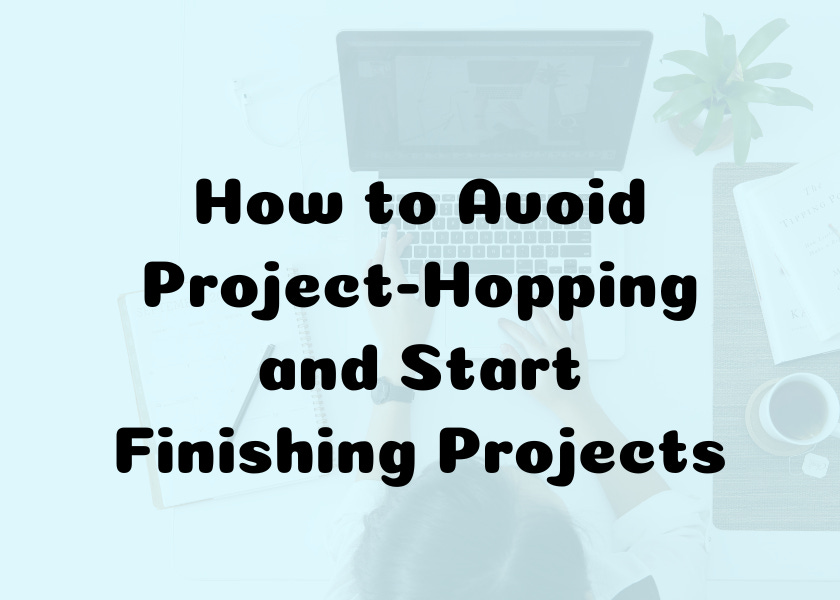How to Avoid Project-Hopping and Finally Start Completing Projects as Someone who is Interested in Everything and Gets Distracted Easily
A guide for using project-based learning to turn your multipotentiality from a potential superpower into an actual superpower
Are you someone who is interested in many different things?
Maybe you describe yourself as a ‘Scanner’, or maybe you prefer Multipotentialite, Generalist, or Renaissance Man/Woman. It doesn’t really matter for what I’m talking about today (I looked at all the differences and similarities between them a while back, in case you're interested).
What matters is that if you identify with one of those labels, chances are you also:
Love to learn
Are naturally curious
Prefer variety over a single-minded focus
Define success by mastery, not external rewards
Enjoy the kind of work that doesn't follow a plan or linear process
If that’s you, then you’re probably familiar with the following problem as well:
Hopping from project to project and leaving most of them incomplete
This is something I dealt with for many years, and that frustrated me to no end. Luckily, I eventually found a way to solve this problem. That’s what I’ll share with you today.
Before we start, let’s make one thing clear: Being curious and interested in many different things is a good thing.
People aren’t machines who are meant to do only one thing, over and over again. The fact that this is often expected from us is part of the reason why so many people are suffering from mental illnesses these days. Being curious and interested in many different things is a sign of a healthy mind, if you ask me.
And as a society, we need people with a wide range of interests who can connect ideas across different domains. That’s how we solve complex problems, and that’s also where the future of innovation lies.
So lesson 1 is: There’s nothing wrong with you. You don’t have to change who you are. Trying to turn yourself into a specialist who only focuses on one thing won’t work.
What you will have to change is how you explore and develop your interests.
Because here’s the problem: Since we're interested in everything, we often spread ourselves too thin, and try to do too many things at once.
On top of this, we are often haunted by shiny object-syndrome or fear of missing out (FOMO), which is why we tend to hop from one project to the next—before the effort we invested into that first project had a chance to pay off and deliver a return on investment.

The danger here is ending up a jack-of-all-trades and master of none.
If you keep hopping from project to project and abandoning most of them, you’ll never develop any skill or field of knowledge beyond that of a beginner.
That’s a problem because if you want to actually use your skill, you need to develop a certain degree of expertise. And if you want other people to pay you for this skill, then you absolutely have to develop expertise.
At the same time, there’s often the problem that you think you'll enjoy pursuing a particular new interest—but because you've never actually tried it out, you don't really know. And you don't want to spend a lot of money (e.g. buying expensive tools and materials) or time (e.g. taking a week-long course) to find out if this thing is really for you.
To solve this problem and honor my need for variety at the same time, I use time-bound, project-based learning:
Project-based learning simply means you're building something concrete in the real world (writing a book, developing an app, assembling a drone, building a piece of furniture etc.)
Time-bound means setting a deadline. How tight that deadline should be, depends on the project you’re building. It should be tight enough that there is some urgency, but at the same time, not so tight that it becomes unrealistic.
Here are a few examples:
To explore an interest in writing fiction, start by writing a short story within the next 30 days.
To explore an interest in coding, build a simple app within the next 30 days.
To explore starting an online business, build a simple product (like a Kindle book) within the next 90 days and try to pre-sell it while you create it.
To start learning about logotherapy, write an article about it within the next 30 days.
It’s really that simple, but it works!
Here’s why this works:
Turning your new interest into a tangible project gives you a direction for your learning.
Think about it: What happens when you decide to “learn about woodworking”, but you’re not actually working on a woodworking project?
I’ll tell you what happens:
You’ll watch hours and hours of tutorials
You’ll look at tools online that you might need
You’ll check out all the different cool things you could build
…and so on. But then, when you finally decide to get to work and actually start building something (let’s say a chair), you’re dumbfounded. Maybe you won’t even know where to start. All those tutorials were for nothing.
In contrast, when you start out with a specific, tangible project in mind (build a chair), you’ll be much more intentional about your learning.
Don’t know how to start building a chair? Finding the answer is your first task. And you can safely ignore everything else.
Don’t know what the second step of building a chair is? Go figure it out! And ignore everything else again.
You’re no longer just “learning about this new thing”. You’re learning SO THAT you can build your project. You’re learning by doing, in a self-directed way. You have a specific goal!
Exploring your new interest this way comes with a number of benefits:
You increase your confidence that you can and will complete things.
You always have something tangible to show for the time and effort you invested.
You complete the project (and thus learn something) before you have a chance to lose interest (if you set the deadline right—see below for that).
You earn quick wins, which will give you a nice boost of motivation and increase your self-efficacy (your belief that you have what it takes to complete projects like this).
If you realize this new interest isn’t for you after all, then you haven't lost much time or money. But at the same time, you’re making your decision not to pursue this interest further based on real data, not just based on a gut feeling.
You keep FOMO and shiny-object syndrome in check because you’ll be done with your project before FOMO has a chance to set in—again, if you set your deadline right.
Also, there’s something about learning and completing projects that I can’t really explain, but that I have experienced through writing many times: You only learn something when you complete something. You only start becoming a better writer when you complete your first article or story.
How to use time-bound, project-based learning effectively
To use project-based learning effectively, you need to get two things right:
The size or scope of your project
The deadline
Both these things matter for your motivation and your chances of actually completing your project.
Project size: On the one hand, if you make your project too small, it may not be challenging enough, and you might not be very motivated to work on it. On the other hand, if you make it too large, then it can be demotivating because it’s too challenging or will take too much time. Plus, there’s the danger of you getting distracted or losing interest before you complete it.
Deadline: On the one hand, a deadline that is too far in the future is a recipe for procrastination and distraction. Also, it can be demotivating because it’ll take too long to get that first small win of successfully completing a project. On the other hand, a deadline that is too tight can be demotivating because it’s unrealistic.
And of course, these two are tied together. Bigger projects need longer deadlines—which is why you should start with small ones.
What’s considered small or big depends mostly on your experience in the area you’re exploring, and on the time you have available for this exploration.
For example, let’s say you want to explore fiction writing, but you’ve never written a story before. In that case, writing a full novel is definitely too big for a first project. Especially if you also have three kids and almost no spare time. Writing a flash fiction story (a story with 1,000 words or less) or a short story might be a better project to start with.
On the other hand, if you’re an experienced fiction writer with several novels under your belt, then you won’t learn a ton if you write just another novel. A small project in this case may be writing a 3-book-series (assuming the novels you wrote so far are standalone novels).
Just be honest with yourself. Ask yourself if you have the time and experience to complete the project you chose within the deadline you set. Especially if it’s your first project in an area of interest, smaller is always better.

Rule of thumb: If you think your project might be too big, it probably is.
This first successfully completed project will give you the motivation and confidence you’ll need for that second, bigger project. Or you may realize that you’re not interested in pursuing that interest further after all and can move on to another interest—without having wasted a lot of time, money and effort.
So start small! Especially if you’re a multipotentialite! Because many of us tend to overcomplicate things and to be too ambitious. Ideally, your first project should be so small that you can complete it without changing anything about your lifestyle. Your next projects can be bigger and more challenging.
And make it tangible! “Read 3 books about biochemistry” isn’t a project. “Write a 3,000-word article about the 3 greatest challenges in biochemestry right now” is.
How long should your deadline be for this first project? Assuming you’re exploring a new interest (doing something you’ve never done before), I’d suggest you give yourself 30 days at most for your first project. If you think you can’t complete it in 30 days, then you’re probably overcomplicating it.
Thirty days is also short enough to give you a good shot at completing your project before you lose interest or get distracted. That’s particularly important for multipotentialites because we constantly come across things that grab our interest and could distract us from our project.
But if you can already see that current project completed because the deadline is only a few weeks or even days away, you won’t be distracted from it as easily. You’ll also often find that you’re not even that interested anymore in that new thing that grabbed your interest, and that you’d rather start a second, bigger project in your original area of interest.
This way, not only are you stacking small win on small win, you also always end up with something to SHOW. If anybody questions whether you have what it takes, you can SHOW them that you do—because you built it already!
Okay, but how does this turn my multipotentiality into a superpower?
Simple: With time-bound, project-based learning, you’re combining the focus of a specialist with the breadth of a generalist.
For the duration of your project, you’re a specialist, hyper-focused on one thing, and producing real, tangible results.
But across multiple projects, you’re a generalist, exploring different areas, and thus honoring your natural curiosity and need for variety—and going on your very own life adventure. But of course, you can also stack as many projects as you want on top of each other in one single area of interest, if that feels right for you.
This is something specialists can’t copy because they simply lack that multipotentialite kind of breadth!
Over time, using this approach, you’ll build a porfolio of skills, along with a portfolio of tangible showpieces that proof beyond any doubt that you actually have those skills.
And because multipotentialites are quick learners, you should be able to develop a pretty impressive portfolio of skills rather quickly. This—being quick learners—is one of the advantages multipotentialites have over specialists. So use it!
That way, instead of becoming a dabbler, you essentially do what Scott Adams recommends in his book “How to fail at almost anything and still win big”: You develop a unique combination of skills that will make you stand out and put you in a position of being able to solve problems nobody else can solve, create value nobody else can create, and do work nobody else can do.
And if you play your cards right, you will achieve what only the top 1% of specialists can hope for: You make yourself irreplaceable.
Let me know in the comments below what your first project will be.
P. S. Stacking increasingly bigger projects on top of each other will also help if you’re tired of hopping from interest to interest and would love to stick with something—at least for a few months or years. It’s like knocking over increasingly large domino pieces: By completing a series of projects that keep getting bigger and bigger and that become more and more challenging, you’re building up momentum, motivation, and self-efficacy. That is, you become more and more confident that you can complete the next, similar project. And this will make it more likely that you actually pick a similar project as your next one.
Other ways I can help you: I offer life and career coaching for multipotentialites, polymaths, renaissance people, multipassionate creators, and basically all adventurers of life who don’t want to follow a beaten path through life, but create their own path. You can find more information on my website: https://newrenaissancecoaching.com/1-on-1-coaching/


